
Jornal Brasileiro de Reproducao Assistida
Scope & Guideline
Elevating the discourse in reproductive health.
Introduction
Aims and Scopes
- Assisted Reproductive Technologies (ART):
The journal emphasizes research on ART methodologies, including in vitro fertilization (IVF), intracytoplasmic sperm injection (ICSI), and embryo transfer techniques, examining their effectiveness, protocols, and advancements. - Reproductive Health and Disorders:
A significant focus is placed on conditions affecting reproductive health, including endometriosis, polycystic ovary syndrome (PCOS), and male infertility, exploring both clinical and experimental studies. - Genetic and Molecular Factors:
Research on genetic influences on fertility, including studies on gene expression, polymorphisms, and preimplantation genetic testing, is a core area of interest. - Psychosocial Aspects of Reproductive Medicine:
The journal explores the psychological and social dimensions of infertility and ART, including the emotional well-being of patients undergoing treatment and the impact of societal factors. - Innovative Treatments and Interventions:
Emerging therapies, including the use of stem cells, platelet-rich plasma, and various supplements, are investigated for their potential benefits in enhancing reproductive outcomes. - Public Health and Policy:
Research addressing the implications of reproductive health practices on public health and the ethical considerations surrounding ART is also featured, promoting informed decision-making.
Trending and Emerging
- Impact of Lifestyle Factors on Reproductive Health:
Recent publications increasingly address how lifestyle choices—such as diet, exercise, and mental health—affect fertility, signaling a growing awareness of holistic health in reproductive outcomes. - COVID-19 and Reproductive Health:
The pandemic has spurred a surge in research concerning the effects of COVID-19 on fertility and reproductive health, highlighting the need for understanding and addressing new challenges posed by global health crises. - Ethical and Social Considerations in Reproductive Medicine:
There is an emerging emphasis on the ethical implications of reproductive technologies, including discussions around consent, third-party reproduction, and the social dynamics of assisted reproduction. - Advancements in Genetic Testing:
The integration of advanced genetic testing techniques, such as non-invasive preimplantation genetic testing and studies on genetic markers, is becoming more prominent, reflecting technological advancements in the field. - Microbiome Research in Fertility:
An increasing interest in how the microbiome influences reproductive health, particularly in relation to the endometrial and vaginal microbiota, is gaining traction as a significant area of study.
Declining or Waning
- Traditional Fertility Treatments:
There seems to be a waning focus on traditional methods of fertility treatment, such as clomiphene citrate protocols and basic intrauterine insemination (IUI), as newer, more advanced techniques gain favor. - Single-Factor Studies:
Research concentrating solely on one factor affecting fertility—such as just male or female contributions—has decreased, as there is a growing recognition of the need for a more holistic approach. - Invasive Diagnostic Procedures:
There is a noticeable reduction in studies centered on invasive procedures for diagnosing infertility, as non-invasive techniques and biomarkers are becoming more favored in recent research.
Similar Journals

THERIOGENOLOGY
Empowering the future of animal husbandry with impactful studies.THERIOGENOLOGY is a prestigious academic journal published by Elsevier Science Inc, dedicated to the field of veterinary reproduction and animal science. With an impressive impact factor and recognized as a Q1 journal in various categories including Animal Science and Zoology, Equine, Food Animals, and Small Animals, THERIOGENOLOGY has established itself as a vital resource for researchers, practitioners, and students alike. Founded in 1974, the journal covers a broad spectrum of topics related to reproductive physiology, biotechnology, and the health management of food and companion animals. Although it does not currently offer open access, researchers can benefit from its comprehensive articles and reviews that push the boundaries of knowledge in veterinary science. With a significant placement in the Scopus rankings, ranking #1 in multiple veterinary categories, THERIOGENOLOGY serves as an essential platform for advancing the understanding of reproductive strategies and practices, thereby contributing directly to the fields of animal husbandry and veterinary medicine.

Reproductive Medicine
Exploring the Frontiers of Reproductive MedicineReproductive Medicine is an esteemed open-access journal published by MDPI, focusing on the latest research and advances in reproductive health, fertility, and assisted reproductive technologies. With its E-ISSN of 2673-3897, the journal aims to provide a platform for researchers, clinicians, and healthcare professionals to disseminate their findings, share innovative practices, and engage in scholarly discourse. Situated in Basel, Switzerland, Reproductive Medicine emphasizes a multidisciplinary approach, exploring biological, clinical, and psychological aspects of reproductive health. Although the journal is in the early stages of establishing metrics such as H-index and Scopus rankings, its open-access model enhances accessibility, allowing for a broad dissemination of knowledge. Committed to fostering advancements in the field, Reproductive Medicine is essential for those seeking to stay at the forefront of reproductive health research.
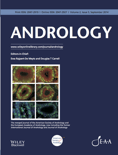
Andrology
Advancing male reproductive health through innovative research.Andrology, an esteemed journal published by WILEY, is dedicated to advancing the field of reproductive health and medicine. With an ISSN of 2047-2919, this journal spans critical topics in andrology, urology, and endocrinology, reflecting its strong commitment to scholarly excellence and innovation. As a Q1 ranked journal in both Reproductive Medicine and Urology, Andrology boasts impressive Scopus rankings, standing at 6th in Reproductive Medicine and 8th in Urology, placing it in the top 10% of its field. The journal is accessible as an Open Access platform, ensuring that valuable research findings are available to a broader audience. With significant impact evidenced by its categorization in Q2 for Endocrinology and Diabetes and Metabolism, Andrology serves as an essential resource for researchers, clinicians, and students alike, supporting the continued advancement of knowledge and practice in male reproductive health.
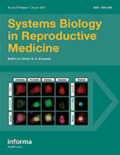
Systems Biology in Reproductive Medicine
Exploring the intricate connections of reproductive systems.Systems Biology in Reproductive Medicine, published by Taylor & Francis Inc, is a leading journal dedicated to advancing the understanding of reproductive health through the lens of systems biology. With an ISSN of 1939-6368 and an E-ISSN of 1939-6376, this journal provides an essential platform for researchers and practitioners in the fields of reproductive medicine and urology. Although it primarily operates under a subscription model, the journal remains a valuable resource, featuring cutting-edge research and comprehensive reviews that reflect its Q2 ranking in both Reproductive Medicine and Urology categories. Recognized for its impactful research, indicated by its ranks of #37/120 and #30/90 in Scopus for Urology and Reproductive Medicine respectively, it addresses complex biological systems and their implications in reproductive health. Aimed at facilitating interdisciplinary collaboration, the journal covers a wide array of topics relevant to both the medical and scientific communities, making it an indispensable resource for ongoing education and advancements in reproductive medicine.
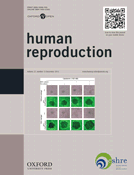
HUMAN REPRODUCTION
Exploring the latest breakthroughs in reproductive health.HUMAN REPRODUCTION is a prestigious academic journal published by Oxford University Press, dedicated to advancing the field of reproductive medicine. With an impressive impact factor highlighting its significance, the journal ranks in the top quartile (Q1) for Obstetrics and Gynecology, Rehabilitation, and Reproductive Medicine, showcasing its crucial role in disseminating high-quality research. Founded in 1986, it has become a key resource for researchers, practitioners, and students interested in cutting-edge developments and innovative practices in human reproduction. Despite not currently offering open access, the journal continues to publish a wealth of peer-reviewed articles that contribute substantially to clinical knowledge and practice. With Scopus rankings placing it among the top journals in its categories, HUMAN REPRODUCTION remains an essential platform for discussion and dissemination of vital findings impacting reproductive health globally.

JOURNAL OF ASSISTED REPRODUCTION AND GENETICS
Advancing the Frontiers of Reproductive ScienceThe Journal of Assisted Reproduction and Genetics, published by Springer/Plenum Publishers, serves as a pivotal platform for innovative research and advancements in the fields of reproductive medicine, genetics, and developmental biology. With an impact factor that positions it within the upper echelon of its categories—including Q1 rankings in Obstetrics and Gynecology and Reproductive Medicine—this journal plays a critical role in disseminating high-quality, peer-reviewed studies that significantly influence clinical practices and research directions. Renowned for its commitment to enhancing understanding in areas such as assisted reproductive technologies, genetic screening, and reproductive health, the journal attracts contributions from leading experts worldwide. With a broad scope encompassing original research, case studies, and comprehensive reviews, the Journal of Assisted Reproduction and Genetics continues to be an essential resource for researchers, healthcare professionals, and students dedicated to the advancement of reproductive sciences.
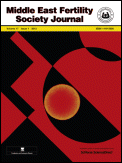
Middle East Fertility Society Journal
Unlocking the potential of reproductive research for all.Middle East Fertility Society Journal is a premier open-access publication established in 1996 that caters to the fields of Obstetrics and Gynecology as well as Reproductive Medicine. Published by SPRINGER in Egypt, this journal has made significant strides in disseminating high-quality research and advancements in reproductive health, achieving a 2023 Scopus rank of #102 in Obstetrics and Gynecology and #47 in Reproductive Medicine, placing it in the 51st and 48th percentiles respectively. With an aim to foster collaboration and innovation in the fertility sector, it welcomes researchers and practitioners to share their findings and insights, contributing to the global discourse on reproductive issues. As an open-access journal since 2010, it ensures that the latest research is readily available to a broad audience, enhancing accessibility and knowledge transfer in the vital area of reproductive health.

Reproductive and Developmental Medicine
Innovating pathways in reproductive health and biology.Reproductive and Developmental Medicine is a pioneering open-access journal dedicated to advancing knowledge in the fields of reproductive medicine and developmental biology. Published by LIPPINCOTT WILLIAMS & WILKINS, the journal serves as a platform for researchers, clinicians, and graduate students alike, fostering collaboration and dissemination of innovative research findings. With an ISSN of 2096-2924 and E-ISSN 2589-8728, it has established a significant presence in the academic community since its inception in 2017. The journal is indexed in Scopus and achieved a category quartile ranking of Q3 in Obstetrics and Gynecology and Q4 in Reproductive Medicine as of 2023, highlighting its importance as a resource for cutting-edge studies and reviews in these vital areas. The journal's open-access model ensures that research is readily available to scholars and practitioners worldwide, thus enhancing the global discourse in reproductive health and development. This makes Reproductive and Developmental Medicine an invaluable resource for those dedicated to improving outcomes in obstetrics, gynecology, and reproductive health.
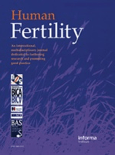
Human Fertility
Transforming Obstetrics and Gynecology through EvidenceHuman Fertility, published by Taylor & Francis Ltd, is a key academic journal that serves the dynamic fields of medicine, obstetrics and gynecology, and reproductive medicine. Established in 1998 and with converged content extending to 2024, the journal holds a notable Q2 ranking in its respective categories, highlighting its influence and scholarly contributions to current research and practice. With an ISSN of 1464-7273 and an E-ISSN of 1742-8149, it rigorously disseminates studies, reviews, and advancements in human fertility, particularly emphasizing evidence-based practices and innovative techniques. Despite its traditional subscription model, the journal remains vital for researchers, healthcare professionals, and students seeking to foster advancements in reproductive health. Its articles are pivotal in addressing the multifaceted challenges faced in reproductive health and guiding future research trajectories.

Reproductive Medicine and Biology
Connecting global minds in reproductive medicine.Reproductive Medicine and Biology, an esteemed journal published by WILEY, stands at the forefront of advancements in the field of reproductive health and associated biological sciences. With an impact factor that underscores its relevance—ranking in Q1 for Reproductive Medicine and Q3 in Cell Biology—this journal is distinguished by its commitment to disseminating high-quality, peer-reviewed research since its transition to Open Access in 2002. Based in Japan, the journal caters to a global audience, providing vital insights into reproductive biology, therapeutics, and innovative practices. With Scopus rankings placing it at #22 out of 90 in Reproductive Medicine and a commendable percentile ranking, Reproductive Medicine and Biology aims to foster dialogue and knowledge transfer among researchers, professionals, and students, paving the way for breakthroughs in understanding reproductive health.